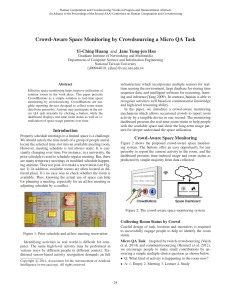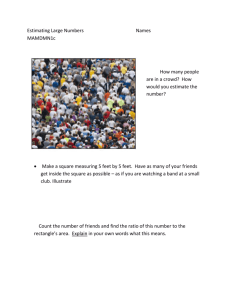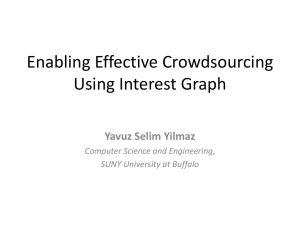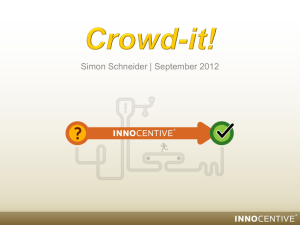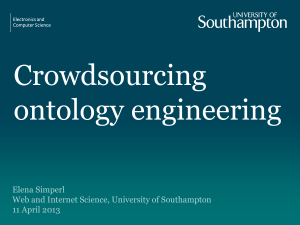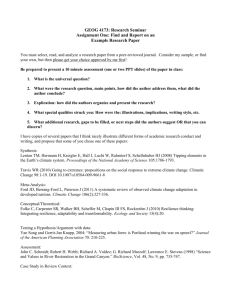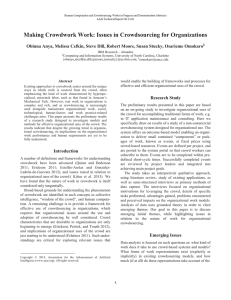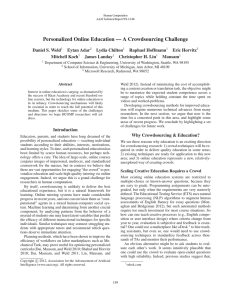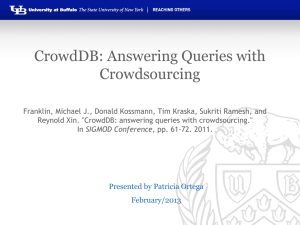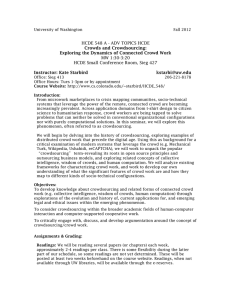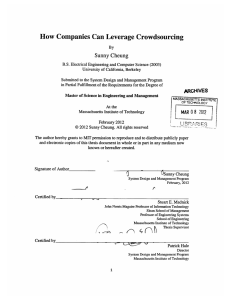VTrack: Accurate, Energy-Aware Road Traffic Delay Estimation
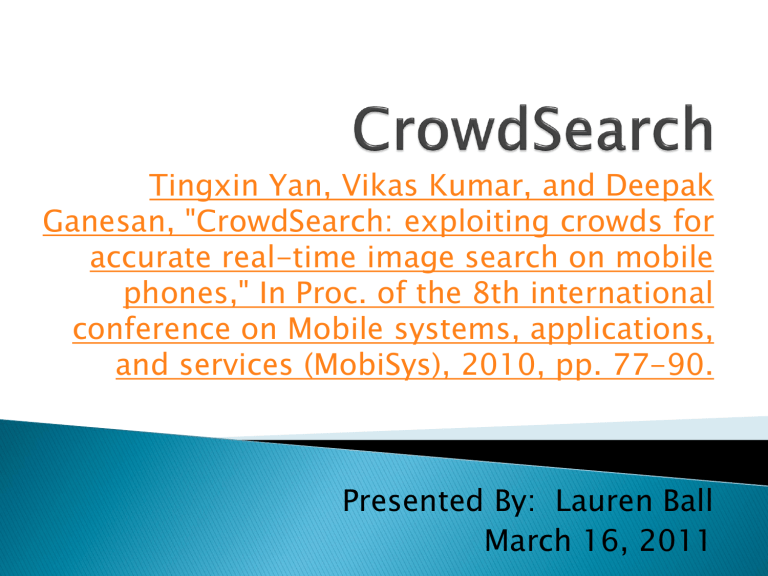
Tingxin Yan, Vikas Kumar, and Deepak
Ganesan, "CrowdSearch: exploiting crowds for accurate real-time image search on mobile phones," In Proc. of the 8th international conference on Mobile systems, applications, and services (MobiSys), 2010, pp. 77-90.
Presented By: Lauren Ball
March 16, 2011
Smartphone Capabilities
◦ Massive Deployment
◦ Many Sensors (3G, WiFi, GPS, Camera, Microphone, etc)
Searching Internet Via Smartphone
◦ Trends
70% Smartphone users use internet search
Growth suggests phone searches will dominate other computing devices
◦ User Interface
Searching via typing annoying
Not always a good way to show multiple results
Most successful work for Smartphone Internet
Search has been done using GPS and Voice
Using Phone Camera and Image Processing
◦ Real-time
Results have been mostly inaccurate
No good way to show many results
Results must be precise
◦ Human in the loop
Accurate
Expensive
Can have unacceptable delay
Only works on certain image categories
Often chooses item which is clearly not the focus of the picture
Unreliable
University of Massachusetts in 2010
Goal
◦ Exploiting crowds for accurate real-time image search on mobile phones
CrowdSourcing
◦ Outsource tasks to a group of people
Via Amazon Mechanical Turk (AMT)
◦ Leverages that humans are good at recognizing images
◦ Improves image search precision
◦ Needs to be optimized for cost and delay
Outlet for CrowdSourcing
“Workers” do simple tasks for monetary reward
MTurk API for “Requesters”
Components
Mobile Phone
Queries
Local Image Processing
Displays responses
Remote Server
Cloud Backend
Image Search
Triggers Image Validation
Crowd Sourcing System
Validates Results
Crowd Search Query
Requires
Image
Query deadline
Payment mechanism
Looks to find multiple verifications
Parallel posting
◦ Immediately posts all candidates
◦ Pro: Minimizes delay
◦ Con: Maximum cost guaranteed
Serial Posting
◦ Posts top ranked candidate first and waits for results then posts next (and continues)
◦ Pro: Minimizes cost
◦ Con: Maximizes delay
Identifies Ranked Candidate Images
◦ Scale-invariant feature transformation is used (SIFT)
◦ Detects and Describes local features in images
◦ Finds images with closest matching features
Performs Crowd Search Algorithm
Attempts to return at least one correct result within the deadline specified
Uses a balance of the Parallel and Serial
Methods to optimize for Delay and Cost
Two Major Components
◦ Delay Prediction
◦ Result Prediction
Delay consists of
◦ Acceptance Delay
◦ Submission Delay
With Crowd Search a model of the delay was developed in order to be able to accurately predict delay times.
Probability of 'YNYY' occurring after 'YNY' is
0.16 / 0.25 = 0.64
This result is showing a
Majority of 5 case
iPhone Application
Considered 4 Image Categories
◦ Human Faces
◦ Flowers
◦ Buildings
◦ Book Covers
Server was trained on 1000s of images
Tested 500 images to measure for
◦ Precision - #correct results/#correctly returned to user
◦ Recall – #correctly retrieved/#correct results
◦ Cost – in dollars
Looked to minimize energy consumption
Partitioning Minimal Server Processing to Phone
Using iPhone
◦ AT&T 3G
More Power Consumption
Lower Bandwidth
◦ WiFi
Better Power Consumption
Higher Bandwidth
Using the server backend for processing with WiFi communication showed the best results !
Crowd Search was able to reach greater than
95% precision for the image types explored
Compared to other systems Crowd Search provides up to 50% search cost savings
Crowd Search Optimized for Cost and Delay better than a pure serial or parallel method
Improve Performance
◦ Currently takes ~2 minutes
◦ Initial image processing tuning
Online training of models
◦ Increasing data sets
Crowd Sourcing for other inputs (video, audio, etc)
Improving payment models
[1] M. Azizyan, I. Constandache, and R. Choudhury.
Surroundsense: mobile phone localization via ambience fingerprinting. In Proceedings of MobiCom 09, Sep 2009.
[2] R. Baeza-Yates and B. Ribeiro-Neto. Modern Information
Retrieval. ACM Press, 1999.
[3] K. P. Burnham and A. D. R. Model Selection and Multimodel
Inference: A Practical Information-Theoretic Approach,
Second Edition. Springer Science, New York, 2002.
[4] A. T. Campbell, S. B. Eisenman, N. D. Lane, E. Miluzzo, and
R. A. Peterson. People-centric urban sensing. In WICON ’06:
Proceedings of the 2nd annual international workshop on
Wireless internet, page 18, New York, NY, USA, 2006. ACM.
[5] O. Chum, J. Philbin, M. Isard, and A. Zisserman. Scalable near identical image and shot detection. In Proceedings of CIVR
’07, pages 549–556, New York, NY, USA, 2007.
[6] E. Cuervo, A. Balasubramanian, D. ki Cho, A. Wolman,
S. Saroiu, R. Chandra, and P. Bahl. Maui: Making smartphones last longer with code offload. In In Proceedings of
ACM MobiSys, 2010.
[7] S. B. Eisenman, N. D. Lane, E. Miluzzo, R. A. Peterson,
G. seop Ahn, and A. T. Campbell. Metrosense project:
People-centric sensing at scale. In In WSW 2006 at Sensys,
2006.
[8] A. Kittur, E. Chi, and B. Suh. Crowdsourcing user studies with mechanical turk. CHI 2008, Jan 2008. Crowdsourcing applied to user study.
[9] D. G. Lowe. Distinctive image features from scale-invariant keypoints, 2003.
[10] H. Lu, W. Pan, N. D. Lane, T. Choudhury, and A. T.
Campbell. Soundsense: scalable sound sensing for people-centric applications on mobile phones. In MobiSys, pages 165–178, 2009.
[11] M.-E. Nilsback. An automatic visual Flora - segmentation and classification of flowers images. PhD thesis, University of
Oxford, 2009.
[12] M.-E. Nilsback and A. Zisserman. Automated flower classification over a large number of classes. In Proceedings of the Indian Conference on Computer Vision, Graphics and
Image Processing, Dec 2008.
[13] J. Philbin, O. Chum, M. Isard, J. Sivic, and A. Zisserman.
Object retrieval with large vocabularies and fast spatial matching. In CVPR, 2007.
[14] V. S. Sheng, F. Provost, and P. G. Ipeirotis. Get another label?
improving data quality and data mining using multiple, noisy labelers. In In Proceeding of KDD ’08, pages 614–622, 2008.
[15] A. Sorokin and D. Forsyth. Utility data annotation with amazon mechanical turk. Computer Vision and Pattern
Recognition Workshops, Jan 2008.
[16] http://images.google.com/imagelabeler/. Google Labeler.
[17] https://www.livework.com/. LiveWork: Outsource Business
Tasks To Teams of On-Demand Workers.
[18] http://www.abiresearch.com/research/1002762-US+Mobile+
Email+and+Mobile+Web+Access+Trends. US Mobile Email and
Mobile Web Access Trends - 2008.
[19] http://www.chacha.com/. ChaCha: Real people answering your questions.
[20] http://www.crowdspirit.com/. CrowdSpirit: enables businesses to involve innovators from outside the company directly in the design of innovative products and services.
[21] http://www.google.com/mobile/products/search.html#p=default.
Goggle: Google image search on mobile phones.
[22] http://www.sensorplanet.org/. Sensor Planet: a mobile device-centric large-scale Wireless Sensor Networks.
[23] http://www.taskcn.com/. Taskcn: A platform for outsourcing tasks.
[24] http://www.theextraordinaries.org/crowdsourcing.html. The
Extraordinaries.
[25] http://www.topcoder.com/. www.topcoder.com.
[26] http://www.vlfeat.org/~vedaldi/code/siftpp.html. SIFT++: a lightweight C++ implementation of SIFT detector and descriptor.
[27] http://www.wired.com/gadgetlab/2008/12/amazons-iphone/.
Amazon Mobile: Amazon Remember.
[28] L. von Ahn and L. Dabbish. Labeling images with a computer game. In CHI ’04: Proceedings of the SIGCHI conference on
Human factors in computing systems, pages 319–326, New
York, NY, USA, 2004. ACM Press.
[29] L. von Ahn, B. Maurer, C. Mcmillen, D. Abraham, and
M. Blum. recaptcha: Human-based character recognition via web security measures. Science, 321(5895):1465–1468, August
2008.
[30] T. Yan, D. Ganesan, and R. Manmatha. Distributed image search in camera sensor networks. In Proceedings of SenSys
2008, Jan 2008.
[31] C. Zhu, K. Li, Q. Lv, L. Shang, and R. Dick. iscope: personalized multi-modality image search for mobile devices. In
Proceedings of Mobisys ’09, Jun 2009.
